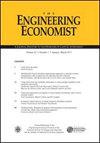Distribution of the internal and external rates of return in a partially stochastic oil pump problem
IF 1.2
4区 经济学
Q4 BUSINESS
引用次数: 1
Abstract
ABSTRACT This article revisits a classic two-period engineering economy problem known as the oil pump problem and adds randomness to its cash flows one at a time. Conditional cumulative probability density functions of the internal and unconditional cumulative probability density functions of the external rates of return are reported. The analytical results are verified with Monte Carlo simulation. A procedure is proposed to assess project desirability by using the probability of project acceptance as the output. The cumulative distribution functions of both rates are used in numerical examples to illustrate how project desirability or acceptance probabilities can be calculated. It is shown that the distribution of the external rate of return yields the same probability of acceptance as the distribution of the internal rate of return. This article provides an up-to-date and exhaustive review of the literature on the distribution of the rate of return in stochastic investment problems. The review also shows that the oil pump problem is still popular and widely discussed.部分随机油泵问题的内外收益率分布
本文重新审视了一个经典的两期工程经济问题,即油泵问题,并在其现金流中增加了随机性。报告了内部收益率的条件累积概率密度函数和外部收益率的无条件累积概率密度函数。通过蒙特卡罗仿真验证了分析结果。提出了一种利用项目接受概率作为输出来评估项目可取性的程序。在数值实例中使用了这两种比率的累积分布函数来说明如何计算项目的可取性或可接受概率。结果表明,外部收益率的分布与内部收益率的分布产生相同的接受概率。这篇文章提供了一个最新的和详尽的文献回顾在随机投资问题的回报率分布。回顾还表明,油泵问题仍然是普遍和广泛讨论的问题。
本文章由计算机程序翻译,如有差异,请以英文原文为准。
求助全文
约1分钟内获得全文
求助全文
来源期刊

Engineering Economist
ENGINEERING, INDUSTRIAL-OPERATIONS RESEARCH & MANAGEMENT SCIENCE
CiteScore
2.00
自引率
0.00%
发文量
14
审稿时长
>12 weeks
期刊介绍:
The Engineering Economist is a refereed journal published jointly by the Engineering Economy Division of the American Society of Engineering Education (ASEE) and the Institute of Industrial and Systems Engineers (IISE). The journal publishes articles, case studies, surveys, and book and software reviews that represent original research, current practice, and teaching involving problems of capital investment.
The journal seeks submissions in a number of areas, including, but not limited to: capital investment analysis, financial risk management, cost estimation and accounting, cost of capital, design economics, economic decision analysis, engineering economy education, research and development, and the analysis of public policy when it is relevant to the economic investment decisions made by engineers and technology managers.
 求助内容:
求助内容: 应助结果提醒方式:
应助结果提醒方式:


